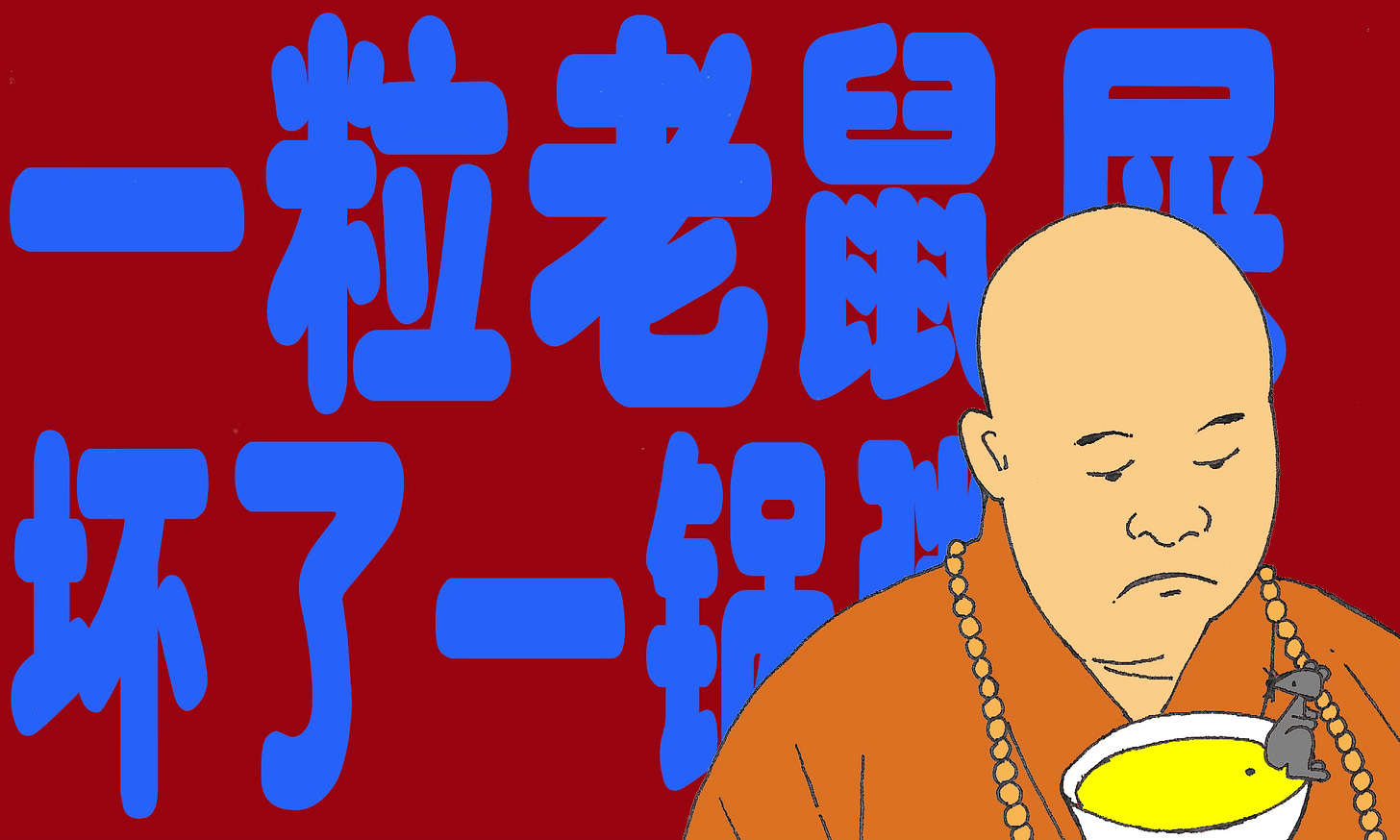"One mouse dropping ruins a whole pot of porridge" — Phrase of the Week
The fall of the Shaolin Temple abbot casts a long shadow

Our phrase of the week is: "One mouse dropping ruins a whole pot of porridge" (一粒老鼠屎,坏了一锅粥 yí lì lǎo shǔ shǐ, huài le yì guō zhōu)
Context
The abbot of the world-renowned Shaolin Temple, Shi Yongxin (释永信), is under investigation for corruption.
He is accused of embezzling project funds and temple assets; maintaining improper relationships with multiple women over an extended period, and fathering illegitimate children.
Born Liu Yingcheng (刘应成) in rural Anhui Province in 1965, he arrived at the run-down Shaolin Temple at age 16 in 1981. The temple was then overgrown and nearly abandoned. After becoming a disciple of the 29th abbot, he rose quickly through the ranks—joining the management committee at 19, becoming its chairman at 22, and effectively taking control of operations. Upon becoming abbot, he transformed Shaolin from crumbling relic to global martial arts brand over the next two decades.
But success brought scrutiny.
In 2015, a former monk accused Shi of financial misconduct, identity fraud, and inappropriate relationships. Authorities dismissed the claims citing lack of evidence.
He now faces similar allegations once more. But this time feels different. Shi hasn't appeared publicly since July 20.
The allegations have stained Shi's legacy and cast a long shadow over Shaolin Temple's storied name, as one well-known Buddhist teaching explains:
When people think of monks these days, what comes to mind isn’t oil lamps and ancient Buddhas, but luxury cars and lavish mansions. So what in this world can we still truly entrust our faith to?
That’s why people like Shi Yongxin must be thoroughly investigated and severely punished! We can't let them keep wreaking harm under the guise of the monk’s robes. We can't let a few mouse droppings spoil the whole pot of porridge.
想起和尚,脑子里不是青灯古佛,而是豪车豪宅。那这世道,还有什么是能让人真心托付的?所以啊,像释永信这种人,必须往死里查,往重里罚!不能让他们披着袈裟继续祸害人,不能让这几粒老鼠屎坏了一锅粥。 [1]
xiǎng qǐ hé shang, nǎo zi lǐ bú shì qīng dēng gǔ fó, ér shì háo chē háo zhái. nà zhè shì dào, hái yǒu shén me shì néng ràng rén zhēn xīn tuō fù de? suǒ yǐ a, xiàng Shì Yǒngxìn zhè zhǒng rén, bì xū wǎng sǐ lǐ chá, wǎng zhòng lǐ fá! bù néng ràng tā men pī zhe jiā shā jì xù huò hài rén, bù néng ràng zhè jǐ lì lǎo shǔ shǐ huài le yì guō zhōu.
And with that, we have our Sinica Phrase of the Week.
What it means
“A few mouse droppings spoil the whole pot of porridge” is a colloquial Chinese phrase adapted from the original: “one mouse dropping ruins a whole pot of porridge” (一粒老鼠屎坏了一锅粥).
It's apt, given this context, that the phrase has its origins in Buddhism.
It was first referenced in Compendium of Five Lamps (五灯会元), a collection of Chan Buddhist texts compiled in the Song Dynasty and completed in 1253 by Puji (普济, 1179-1253).
Puji was a Chan Buddhist master from Fenghua in present-day Zhejiang Province. He became a monk at 19, and eventually rose to become abbot of the prestigious Jingde Lingyin Temple in Hangzhou. He took two years to complete Compendium, which he managed to do just before he died in 1253.
The work consists of 20 volumes and brings together stories, dialogues, and teachings from five major lineages of Chinese Chan Buddhism. The "five lamps" referrs to these transmission lineages that preserved Buddhist enlightenment teachings.
One of those teachings is our Phrase of the Week:
"What good stew, yet ruined by a single mouse dropping"
好一釜羹,被一颗鼠粪污却
hǎo yì fǔ gēng, bèi yì kē shǔ fèn wū què
This is the classical version of the phrase, but the meaning is the same as the modern version.
Figuratively, it highlights how a single flaw—be it a person, action, or mistake—can taint or discredit an entire group. It’s similar to the English saying “one bad apple spoils the bunch.”
In the case of Shi Yongxin, the phrase suggests his alleged corruption hasn’t just damaged his own reputation—it’s cast a shadow over the wider Shaolin Temple and those associated with it.
Andrew Methven is the author of RealTime Mandarin, a resource which helps you bridge the gap to real-world fluency in Mandarin, stay informed about China, and communicate with confidence—all through weekly immersion in real news. Subscribe for free here.



